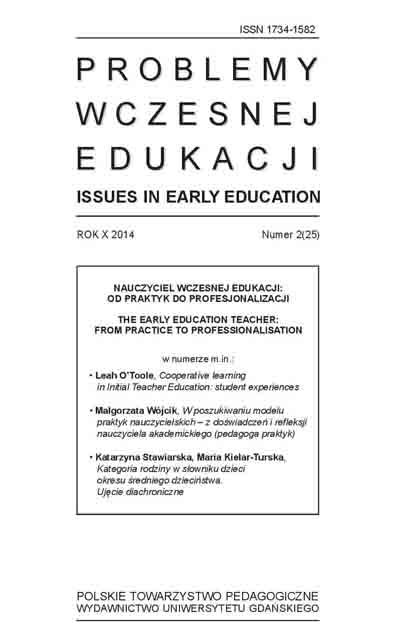Cooperative learning in Initial Teacher Education: student experiences
Cooperative learning in Initial Teacher Education: student experiences
Author(s): Leah O’TooleSubject(s): Social Sciences
Published by: Polskie Towarzystwo Pedagogiczne
Keywords: cooperative approach to teaching and learning; student teachers; views on the experience of the integrated teaching
Summary/Abstract: The benefits of cooperative approaches to teaching and learning are extensively documented (Blatchford et al. 2003; Dillenbourg and Schneider 1995; Hmelo-Silver et al. 2013; Johnson and Johnson 1990, 1991 1994; Neber, Finsterwald and Urban 2001; Rojas-Drummond and Mercer 2003; Ruys et al. 2010; Sapon-Shevin 2004; Slavin 1995; van Aalst 2013; Veenman et al. 2000, 2005; Vygotsky1978), but in spite of this, such methods appear to be largely under-utilised in Initial Teacher Education (ITE) (Ruys et al. 2010; Ryan and O’Toole 2013). This often means that, drawing on their ‘apprenticeship of observation’ (Lortie 1975, 2002), student teachers tend not to use such approaches with children (Bąbka 2012), perhaps due to low self-efficacy beliefs about implementing group work in classrooms (Ruys et al. ibid) and so the ‘social pedagogic potential’ of classroom and indeed university-based learning is therefore unrealised (Blatchford et al. 2003). This paper reports the insights of a cohort of student teachers on their experiences of an integrated, cooperative approach to the teaching and assessment of Psychology and Sociology in Initial Teacher Education in Ireland. In spite of some challenges in terms of logistics, the findings are overwhelmingly positive, with benefits of cooperative learning including deeper and more meaningful learning than in individualistic or competitive approaches, greater application of theory to practice, stronger motivation and more enjoyment of learning on behalf of students, more integrated inter-disciplinary thinking, improvements in academic self-efficacy beliefs and self-confidence, and stronger critical engagement with material.
Journal: Problemy Wczesnej Edukacji
- Issue Year: X/2014
- Issue No: 2 (25)
- Page Range: 7-20
- Page Count: 13
- Language: English

